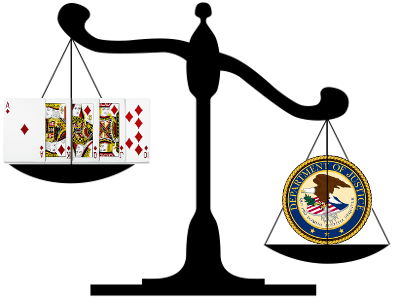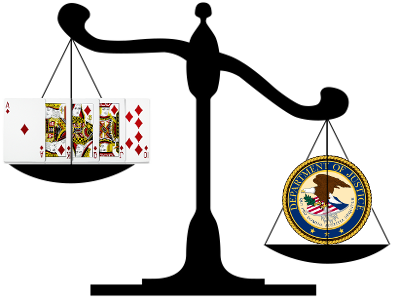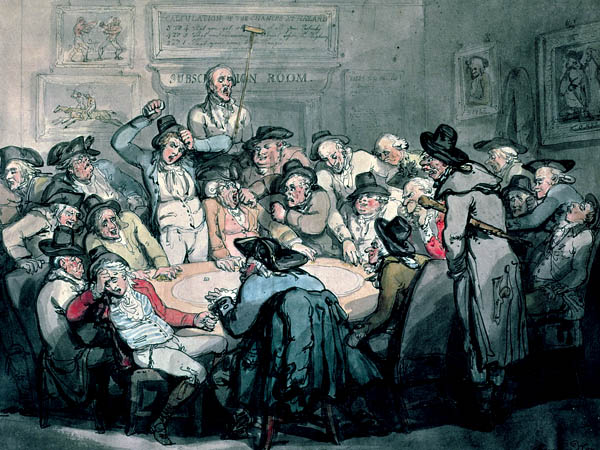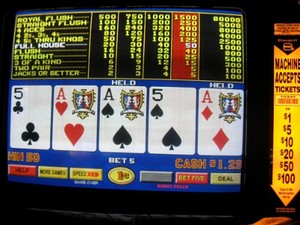

 As reported last weekend, the US Department of Justice (DOJ) has filed a response to John Campos and Chad Elie’s motion to dismiss charges made against them in the Black Friday indictments in connection with their payment processing for online poker sites.
As reported last weekend, the US Department of Justice (DOJ) has filed a response to John Campos and Chad Elie’s motion to dismiss charges made against them in the Black Friday indictments in connection with their payment processing for online poker sites.
The DOJ has long contended that online poker is considered illegal gambling under federal law, despite the lack of settled case law concerned specifically with the game of poker and despite the ambiguity of the language of the laws as they might apply to peer-to-peer skill games. Indeed, the forthcoming potential courtroom showdown between the DOJ and Campos and Elie could lead to the long-awaited opportunity for poker’s place in US gambling law to be definitively clarified.
For the first time ever, this document sketches the arguments that the DOJ holds against poker, highlighting the perspective that has guided their treatment of the game over the years. Regardless of one’s sympathy for the fate of Campos and Elie or their associated online poker rooms, the current legal interpretations of the US government will be important in shaping the US poker economy, at least until new laws are passed.
Please note that your author is not a lawyer, and will not attempt to delve too deeply into the legal complexities of this pending case. Those who are more studied in law may find the full document worth a read, but this summary should be sufficiently illustrative for laymen while discussing the aspects most relevant to the poker community.
Summary
In their original motion to dismiss, Campos and Elie argued that the Illegal Gambling Business Act (IGBA) and Unlawful Internet Gambling Enforcement Act (UIGEA) charges against them were invalid for several reasons, all of which the DOJ disputes.
The document first lays out a brief history of payment processing for internet poker and Campos and Elie’s gradual involvement in the industry, worth a read for anybody curious about the interesting details of how these relationships developed leading up to the indictments. This leads into a brief history of poker being treated as gambling, with a heavy reliance on the early cultural history of the game and featuring the misattribution of Kenny Rogers’ song “The Gambler” to Willie Nelson. Here, Campos and Elie’s claims that the IGBA and UIGEA do not include poker in their definitions of gambling are disputed; we shall delve further into these arguments in the next section.
Later in the document, the DOJ makes similar arguments as to why the IGBA and UIGEA are not void for vagueness in their ambiguity towards poker. In particular, the laws of New York include language that define gambling as any game “in which the outcome depends in a material degree upon an element of chance, notwithstanding that skill of contestants may also be a factor therein”. Therefore, poker is gambling under New York law. However, another reference in the document to the same New York law defines gambling as when a person bets on “...a contest of chance or a future contingent event not under his control or influence…” which seems to potentially exclude poker, though this does not appear to be acknowledged.
Campos and Elie’s motion to dismiss included a claim that their business did not take place “in” New York due to the electronic and jurisdictional nature of the transactions. The DOJ details legal arguments as to why this is not the case, and the general consensus among the poker community seems to be that these charges will be the hardest for Campos and Elie to fight.
Finally, the idea that Campos and Elie are exempt from prosecution under the UIGEA because they are not “in the business of betting or wagering” is disputed, as well as the idea that poker sites are not “in the business of betting or wagering” because they take no outcome risk, deferring again to precedent from other types of gambling activities and legislative intent.
Overall, even if Campos and Elie believe themselves to be innocent, it seems that they may have been ambitious in their motion to dismiss. This document describes how the applicable legal standard to dismiss an indictment requires that the indictment be clearly invalid on its face, which does not seem to be the case given the complexity of these charges and the confidence of the DOJ in their legal position.
Analysis and Opinions
The validity and applicability of the DOJ’s arguments regarding the more technical legal issues of this case are complicated and nuanced, and are likely beyond the scope of the general interest of the poker community as well as the knowledge of this author. If the case does reach court, however, the resolution of whether or not poker is gambling under various laws should be an exciting showdown with potential implications for the future of poker rights in the country.
The foundation of the DOJ’s position that poker is gambling under US law seems to be that poker is treated as gambling culturally, and thus that any plain language interpretation of “gambling” would include poker:
Playing poker for money has, since the birth of the game in the 1800s, been treated both in American culture and law as a form of gambling.
Here, there is nothing ambiguous about the term “gambling” that requires analysis of the canons of construction, particularly in the context of poker. Poker has, throughout its history, been understood to be a kind of gambling… Those who spent their time playing poker in saloons were called “gamblers” from the outset, and poker is described almost unfailingly as “gambling” in a variety of contexts in reported cases dating back to the 1800s.

While cultural and historical usage of a term must surely play a role in determining the legislative intent of gambling statutes, a long-term historical view of poker that dates back to the 19th century is misleading given that the game has experienced such a rapid upheaval in participation rates and in competitive play in the 21st century. Perhaps poker was essentially just a seedy form of gambling in some relevant cultural sense for much of its storied history, but the quantitative revolution of the poker boom has cemented poker as a broadly-appealing pursuit and a game with tremendous strategic depth.
Sure, the social classification of poker as “gambling” still persists today, as does the general framework of confining commercial poker to casinos, but this is to be expected. Complete cultural change takes more than a decade to propagate, but I would hope that the law would react more quickly to modern innovations and developments, or at least put less of an emphasis on ancient history when other methods of classification are available.
In making their case as to why the IGBA and UIGEA should be interpreted to include “gambling” games regardless of whether or not they are also games of skill, the DOJ seems to draw parallels between poker and video poker in two instances:
Multiple Courts of Appeals – including the Second Circuit – have similarly upheld the application of the IGBA to gambling businesses offering video poker. See, e.g., United States v. Gotti, 459 F.3d 296, 342 (2d Cir. 2006) (affirming IGBA conviction for operating video poker machines, and specifically rejecting argument that IGBA and referenced New York gambling law did not apply to games that involved an element of skill)
In the Congressional findings accompanying UIGEA’s enactment, Congress explicitly referenced the Congressionally commissioned “National Gambling Impact Study Commission” of 1999. See 31 U.S.C. § 5361(a)(1). The Commission’s report includes numerous references to “poker” and “video poker.

With all due respect to legal tests that attempt to assess the role of skill in all types of games, it seems quite discouraging that a competitive, multiplayer game such as poker is being treated as involving the same nature of skill as one-player, non-interactive, trivial gambles such as video poker. One can’t help but wonder if, like much of the general public, the DOJ lacks a sufficient understanding as to why poker is a completely different type of game than the unfortunately-named video poker.
More specifically, the particular rebuttal that the DOJ offers for Campos and Elie’s argument that poker is distinct from traditional gambling seems to ignore every relevant characteristic of poker as a strategy game:
... poker shares significant commonalities with several of the listed [traditional gambling] games.
First, defendants claim that in each of the listed games, the bettor has “no role in, or control over, the outcome” and that the game is instead subject only to chance. That is not true with respect to bookmaking, at the very least. Betting on the outcome of sporting events involves “substantial (not ‘slight’) skill,” including “the exercise of [a] bettor’s judgment in trying to . . . figure [out] the point spreads.” Office of the Attorney General of the State of New York, Formal Opinion No. 84-F1, N.Y. Op. Atty. Gen 11 (1984). Sports bettors have every opportunity to employ superior knowledge of the games, teams and the players involved in order to exploit odds that do not reflect the true likelihoods of the possible outcomes. Indeed, academics who have argued that poker should not be treated as a form of illegal gambling on the grounds that it is a “game of skill” make the same argument with respect to sports betting. Ultimately, the outcome of the bets that poker players make on the cards, just like the outcome of the bets on sporting events.
Not only is this commonality quite thin, but the premise here seems faulty; sports betting involves skill in selecting only those betting opportunities which are deemed to be profitable, but the player or investor has no ability to impact the outcome of their bets after placing them. This is an important distinction between gambling or investing on market-based games rather than on closed, strategic competitions like poker.
The second dissimilarity argued by the defendants – that in the listed games, unlike poker, the house bets against its players – is also inaccurate. With respect to poker, the house earns money primarily through the so-called “rake” – taking a small percentage of each pot –which, cumulatively, at least in the case of internet poker, typically results in the house taking approximately 1/3 or more of all funds deposited by players on the poker website (a high transaction cost that impacts returns available to bettors over time).
While poker is in some ways analogous to parimutuel market-based gambling through this type of reasoning, that the house charges a fee for a peer-to-peer game does not mean that the game is played against or bet against the house in the sense of traditional gambling. The rake is a charge that players willingly pay in exchange for the game operator providing a venue to play a game. This fee is, for all intents and purposes, external to the game. The cost that a commercial entity chooses to charge for a good or service does not impact the fundamental nature of that good or service. Certainly, it would seem strange if the DOJ were to argue that raked poker is gambling while rake-free poker is not, which calls the validity of this argument into question.
Conclusion
Notwithstanding the other difficult legal issues surrounding this case, this document by the DOJ finally sheds some light on the details of their years-long insistence that internet poker is illegal under US law. Their arguments on this particular issue seem to be nothing surprising to the poker community, except possibly for how surprising it is that their arguments are so simple and dismissive of every characteristic which makes poker unique from traditional gambling. Should Campos and Elie continue to take their case to court, it could lead to a years-overdue showdown that establishes whether or not poker is doomed to continue to be treated as homogenous with casino gambling going forward.
The modern poker community is armed with evidence and studies which cover almost every conceivable angle of demonstrating how poker is a game of skill and distinct from all other activities traditionally seen as gambling, but will it be enough to overcome the game’s historical association with gamblers, especially given the strict (if inconsistently-applied) definitions of New York gambling law? This seems to be the central issue at play in disputing the position the DOJ has laid out. Millions of American online poker players, having suffered through years of negative effects from their country’s unclear policies towards the game, would be grateful to see this issue clarified. There’s plenty of uncertainty left to go in this battle, but at least now the poker community has gained some knowledge about what they’re up against.

